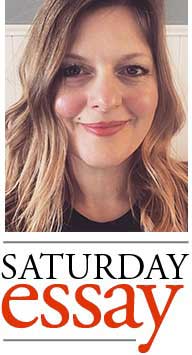Womaning
 At first it’s impossible to understand — this thing happening to you. Imagine yourself at 12, or maybe 13 — or God help you, 19 — whenever puberty finally gored you with its long-awaited tusk. Maybe you’re the girl waiting for her breasts, standing with her shoulders back behind Tammy, the girl who got her boobs in fourth grade, praying it’s somehow contagious, and your proximity will tit you up before your Cup Noodles even fully soften. Maybe you’re the girl who thinks she’s pissed herself on the playground, only to look down and see her crotch a deep, angry red: you’ll have to be done with four-square now, because you’ll need to change into your gym clothes, or call your mom to come get you. Maybe you’re the girl who imagines the lips of other girls, who stands as close to Laurel as possible in lunch line, to smell her delicious hair, and you’re waiting to develop what all the movies and all the people say is inevitable: an exclusive taste for boys.
At first it’s impossible to understand — this thing happening to you. Imagine yourself at 12, or maybe 13 — or God help you, 19 — whenever puberty finally gored you with its long-awaited tusk. Maybe you’re the girl waiting for her breasts, standing with her shoulders back behind Tammy, the girl who got her boobs in fourth grade, praying it’s somehow contagious, and your proximity will tit you up before your Cup Noodles even fully soften. Maybe you’re the girl who thinks she’s pissed herself on the playground, only to look down and see her crotch a deep, angry red: you’ll have to be done with four-square now, because you’ll need to change into your gym clothes, or call your mom to come get you. Maybe you’re the girl who imagines the lips of other girls, who stands as close to Laurel as possible in lunch line, to smell her delicious hair, and you’re waiting to develop what all the movies and all the people say is inevitable: an exclusive taste for boys.
Maybe you held hands with Ben one time on the way home from swimming, and you were too young, and it made you feel dirty to do it, like you stole the money out of the collection bin at church, or got caught touching your privates in the unlocked bathroom by your father. You are on one side of this thing, but also on the other. You are neither and both.
It feels bad.
It probably started changing earlier, before the boobs or blood; I honestly don’t know. But once I started to become a woman, at the age of about 12, everything changed. The priest of my church, a terrifically kind and generous man, returned to our parish to visit (that’s a thing Catholic priests do in Southeast Alaska). He regarded me with new eyes, even though he’d seen me just months before. He placed his hands on my shoulders and said, “Well, Anna! You’re becoming a young lady, aren’t you?” I was frozen, utterly and entirely mortified, wondering what he saw, looking at me. Did he know what I had been thinking? Did he know my heart? Was it just the breasts?
I had been, for the previous 11 years, wearing what I thought were fancy and feminine clothes. I had walked to the Charity Box, one of two thrift stores in my hometown, to buy old high heels for a dime a pair, and then clickity-clacked up and down the sidewalk in front of my home, transfixed by the sound of my feet: they sounded like woman feet, in those shoes. I’d curled and styled my hair, made fake fingernails out of construction paper, and pined for the attention and affection of many young crushes. I had longed for bras, and makeup, and pierced ears. But this moment of transformation in the eyes of a grown up man, a leader in my community, and someone as close to righteous as anyone could possibly be? I knew I wasn’t ready to shoulder the mantle of female sexuality, yet. Mostly because I had no earthly idea what that might entail.
I don’t know how I knew, or that I’d have been able to describe it to anyone else, but I knew. I wasn’t ready to be what I evidently already was. This sort of thing had happened to me in other ways, before. To channel an abundance of childhood creativity my third-grade teacher had me write a book. She believed I could do it because I had an unusual vocabulary for a third grader. I started the project with a sense of doom, knowing what she wanted with the same icy certainty that I wasn’t capable of delivering it. I didn’t know how to do what she wanted, but I knew what I was doing wasn’t it. This was like that. I suddenly knew both what the shape of my body was implying, and that I was incapable of delivering it. I had no language to communicate this to anyone, and assumed this was my own unique configuration. A failure particular to me, singularly and exclusively.
There was no disguising it — eventually, all of the men and boys around me began treating me differently, as though overnight I had turned into a Volkswagen Beetle, or Godzilla monster. I was, unequivocally and categorically, This New Thing. I was the victim of some ruefully diabolical magical crone, switched summarily and unceremoniously into the body of a sexually mature female. Freaky Friday, only for all the days of the week, month, year — forever, from now on.
I felt betrayed by my body, while intractably stuck in a lifelong relationship with it. In my early teens, I realized this sexuality was my new currency. If previously my merit was measured by how fast I could run 25 yards or how good I was at kickball and spelling tests, now, suddenly, it was my ability to be attractive. With the same speed of my transformation from girl to woman, I realized I was not a particularly successful woman. I regarded myself critically in the mirror, the doughy bits, the angular nose, the particularities of my physiology that didn’t match those of say, Cindy Crawford, or any other icon from the late 1980s.
A woman I babysat for, Mrs. Stevenson, a towering beauty with gigantic blonde hair, pointed out that if I wore a little makeup it would really bring out my natural beauty. She meant it as a mercy, in hindsight. It was kindness she painted on my face, as much as eyeshadow and lipstick, that fall afternoon in her living room. When she handed me the mirror, I blushed deep scarlet, and thought for a moment that I might vomit or start crying. I stared at my reflection, in a state of chaotic dissociation. I looked beautiful. I didn’t recognize myself at all.
I managed to thank her and rode my bike home as fast as I could, feeling the penetrating gazes of every driver in every car I passed, and I felt so ashamed and humiliated. I ran into my house, and scrubbed my face bare.
Two years later, staying with my aunt in Rumford, Maine, I developed both a ferocious crush on the paper delivery boy and a positively destructive case of hay fever. My eyes were bloodshot and swollen, and I woke up every morning to gingerly detach my upper eyelids from the lower, like gooey spiders’ legs. I felt monstrous. I stopped waiting for the paper boy to deliver the paper in the morning, sitting in the living room and watching him from the picture window, rather than striking up a conversation. My mother, perhaps picking up on my new Phantom of the Opera identity (and accompanying tragic sighs) brought me a gift one evening: a tube of my very own mascara. I was 13, she said. A little mascara would look nice if I applied it correctly, not like those other girls, with no sense of moderation or artistry. We stood in my aunt’s fancy guest bathroom, and she taught me how to apply it. This time, I regarded myself in mascara, and saw something new: the woman version of me. And with that, I became two things: myself, and a shiny thing that I offered to the world with tiny, feminine hands.
I was not like the other girls — I was determined not to ever be like the other girls. The ones with too much makeup or who were too overtly sexual. I distanced myself from the plain girls who were non-participants in this paradigm: they were powerless. I imagined myself to be successfully navigating a thin and treacherous high wire over some vast canyon filled with the bleached bones of girls who failed to successfully woman.
I learned a modicum of flirtation, how to pose a challenge as a compliment or a question, how to issue an instruction as a gentle request, how to navigate as the kind of woman I thought I wanted to be. And the entire time, for the past 32 years, I have never once been comfortable with it. Because of this, I have never felt I was successfully womaning, because it always felt so other.
Today, I suspect it’s because it’s not a real thing. The role prescribed by seven-thousand years of culture is just that: a role. One that will always feel like that makeup did in Mrs. Stevenson’s living room. Such lovely artifice. Such delicate and detailed filigree around what has always been a smooth and sturdy stone.
The discourse around the Me Too explosion has been eye-opening in ways that reach far beyond sexual harassment and assault. The secret story of the female experience has been revealed in erratic maledictions and a chorus of whispers, steadily rising to the feverish revelation of this moment, when we’re chattering confessions, rants and entreaties furiously at each other, comparing our experiences with what is starting to resemble a shared language. It is consciousness raising on the international level, at the speed of a jet aircraft.
I’m telling you this story because, until the past two years, I sincerely believed I was the only woman who felt this way. And today I know I am literally surrounded by stories identical to mine. I feel a jarring confusion about what we’ll do next, how and who we’ll be, without that delicate filigree. But for now, I am mostly relieved to finally be free of the responsibility to contort myself into a shape unrecognizable to me, or worse yet, immerse myself so utterly in that role that it’s the stone I no longer recognize.
Recommended Links:
Leave a Comment
Only registered members can post a comment , Login / Register Here














1 Comment
Ely_bound
about 6 years ago